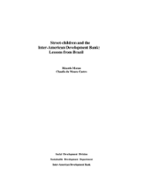Street-children and the Inter-American Development Bank: Lessons from Brazil
Date issued
Mar 1997
Subject
Youth and Children;
Poverty;
Social Policy and Protection;
Urban Development
Country
Brazil
Category
Discussion Papers
The Inter-American Development Bank sponsored a workshop in Terezopolis, Brazil, in August 1995 to review current thinking among analysts and activists involved with programs for youth in Brazil. The Workshop brought together IDB staff working in the areas of Early Child Care and Development (ECCD), street-children, and other youth at risk, with over two dozen people knowledgeable about street-children. Based largely on what they learned in Terezopolis, this paper draws on lessons and proposals for IDB involvement with street-children in Brazil. The key lesson from the Terezopolis meeting and this paper is that the programs with greatest and most lasting impact on the "street-children problem" are not "street-children programs" in the usual sense. Rather, they are programs that help build up the "social" and human capital of the poorest urban communities and families. They focus broadly on all children, including those yet unborn. These programs help provide basic (but "quality") services for sanitation, health and nutrition (especially for pregnant women and children), early child care and development, preschool, and education.



